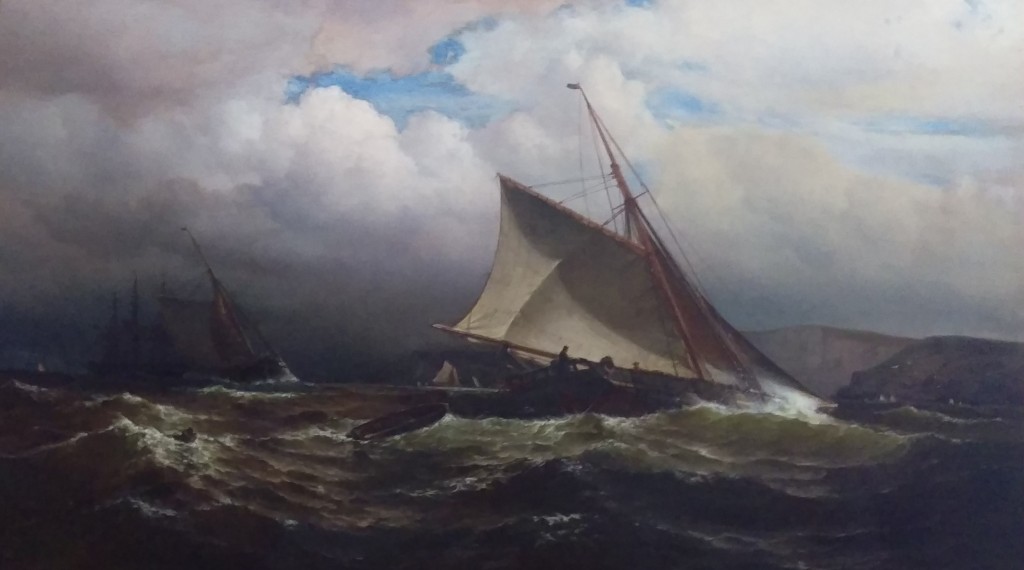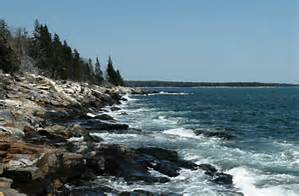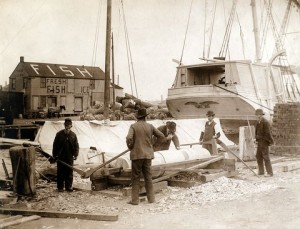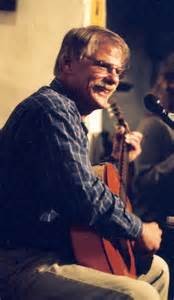
Painting by Mauritz Frederik Hendrik de Haas (1832–1895), Dutch–American painter. Beating to Windward in the English Channel (1872).
Oil on canvas. Image courtesy of Art Collection of New Bedford Free Public Library. (Photo by Janice Hodson, Curator of Art, March 2016.)
When I think of the ocean, especially the areas of the Atlantic sweeping away from the northeastern section of our nation, into Canada and including New Brunswick and Nova Scotia, I think of Gordon Bok.

Photo permission and courtesy of Gordon Bok.
His influence on me has been profound.
I first heard him play his music in Sandy Ives’s barn in Veazie, Maine. This memory I have of him goes back 48 years. Yet, when I recall that time once again, his deep bass voice, his finesse and driving skill in playing either the six–string classical, or the twelve–string acoustic, guitar and his signature poetic style of composing, all rush back to me now; and, once again, remind me of his unforgettable style of performance.
Back then, immediately upon hearing him play, I was jealous as I could be of the effortless mastery he demonstrated. I was upset that I could not summon such an evenhanded and finely balanced ability to pull together the elements of my own style of guitar playing, which was classically based, as I heard and saw Gordon display. I still get twinges of severe envy every time I listen to his music. More than often, though, I am amazed at what he can summon in the power of his art, and I delight in his prowess and in the gifts his artistry brings to me.
He has this harsh, bitter truth of humankind’s relation to the sea pouring into your ears. It’s often a rugged lament of sailors and fishermen, a ballad of those who work at sea and those who remain on land who support them. His is a testimony to their courage, foolishness and experience in working on the ocean. It’s also suffused with love, pain and struggle that haunts the listener with its own tidal pull. Perhaps that was what I felt and it overwhelmed me.
It still does today.

“Ship Carpenters” on a New Bedford pier. Photo courtesy of the Trustees of the New Bedford Free Public Library. (Accession #: 2010.001.1512)
When I listen to songs like “Johnny Todd”, “Rambler”, “The Hills of Isle au Haut”, “Saben, The Woodfitter”, “A Tune for November”, “Wiscasset Schooners”, and “Bay of Fundy”, I know—heart and soul—that I am in in the realm of an amazing and wonderful storyteller.
If you listen carefully you will feel the rise and fall of the ocean currents move you as you embark on a musical journey with him. The gravity of his music is subtle, but flows from him in an undeniable power of lyricism, melody and a unique voicing that seems like an unquenchable, unstoppable tide.
It is indeed, a creature of nature, belonging to the breath of the ocean. Upon hearing it, you can feel it sound the depths of the ocean within each of us.
His writing often has the winds of the Old Testament flowing from it. The famous lines from Psalm 107, verses 23 to 27, come to mind:
23 Those who go down to the sea in ships,
Who do business on great waters,
24 They see the works of the Lord,
And His wonders in the deep.
25 For He commands and raises the stormy wind,
Which lifts up the waves of the sea.
26 They mount up to the heavens,
They go down again to the depths;
Their soul melts because of trouble.
27 They reel to and fro, and stagger like a drunken man,
And are at their wits’ end.
Gordon might disagree with me, I’m not sure. I never mentioned this thought to him. Yet, his music does have a Psalm-like quality to it.

Photo permission and courtesy of Gordon Bok.
What I recall the most about that first night hearing Gordon play was his introduction to a song that is now well known among his fans.
“I’ve been working on a song,” he said to us, “it’s about the seal folk, a lonely man and the sea.”
And, then, he started to play. We were all transported immediately into the tale. He started the song as though it was an instrumental solo. It echoed the sea, a bell ringing from a gong buoy, almost dirge like, a plaint from another time; a world of loss, love and the languor of a deep bond felt between old and new souls. It was melodic, yet stuttered in its forward momentum, almost stopping. Then it did halt, to be filled with the rich, deep voice of his that spoke the story and gave the opening context of what it was going to be about.
Thus, the tale of “Peter Kagan and the Wind” unfurled itself around us. It wrapped us into the sail of the story itself. At the end of it, we awoke with Peter and, like him, we began to realize what had happened and the tragedy that occurred because the tide of destiny, perhaps fate, too, were meant to occur in the way they unfolded.
Over the years, I have seen Gordon in many more concerts, all of them superbly given. He even invited me to his home several times, and each time I visited with him it was as though I had gone into another world, a true home of an artist.
Gordon taught me a lot about inspiration, especially in having the integrity, courage and strength to look directly at the creative spark within. He encouraged everyone around him—who were so inclined to listen—to dig deeply within themselves and find the sources of their own stories.
I think he has a great capacity for wonder and translates that ability into music and song, all of which reveal the predicament and frailty of what it means to be human. Tales, yarns and chanteys of the sea reveal that condition well. Gordon has taken his own love and experience in working on and near the ocean and splined it with care and consummate skill onto such stories of the sea.
I thought then, and still do now, that Tolkien would have very much enjoyed hearing Gordon sing for him. A seal who is also a beautiful woman, falls deeply in love with a man and can call to him so that he hears her “twenty miles to sea”, all seem completely capable at being home in the Middle Earth. Tolkien’s (1892–1973) poem, “To the Sea, To the Sea, the White Gulls are Crying,” which is a song song by Legolas Greenleaf, is a perfect example of that compatibility with Gordon’s own sense of mythmaking.
Around 1975, Gordon invited me into his recording studio in Camden, Maine. He suggested that I record some of my music, if I was so inclined to do so. I had never been in one, and so, this suggestion was both exhilarating and terrifying to me.
Even back then, towards the height of my performance career as a musician, I was trying to deal with the problems afflicting my fine motor coordination. I had an overall body tremor that started raising hell with me. Sometimes when I was performing, a tremor would move throughout my body and lock itself in my hands, making it almost impossible for me to play the guitar. I did not know if that would happen in Gordon’s recording studio.
When I arrived at his studio, he put me immediately at ease. We talked about the projects each of us was involved in, as well as some of the music that we were currently playing. Eventually, he had me set up to record. I recorded a composition that I had written for the classical guitar. It was called “The Ascension and Flight of the Spirit.” I had first started playing it when I was a senior at the University of Maine at Orono. It became my closing composition at concerts and seemed to be liked by many who heard it played.
I have not played it for years now. Indeed, I have mostly forgotten how it goes. It was in three movements and I had put the guitar in a scordatura, or unusual form of, tuning. It went through two different forms.
I never had the chance to listen to what was recorded. When I could no longer play the classical guitar on the concert stage, when I had to “hang up my spurs”, I put the recording away. It survived dozens of moves over the past four decades. I found it once more the other day. I still don’t have any recording equipment to play the tape. I hesitate to do so. Hearing it would open a window that might be too painful for me to see through to the other side.
Ironically, when I think about what happened, the refrain in “Peter Kagan and the Wind” still holds forth, even more now:
Kagan, Kagan, Kagan,
Turn ye now to me.
Turn your back unto the Wind
And all the weary windy sea.
Kagan, Kagan, Kagan,
Lay ye down to sleep.
For I do come to comfort thee
All and thy dear body keep.
Perhaps I can summon the nerve to go to a recording studio and hear once again what I played when I was young and brash. A part of me died when I could not play the guitar on the concert stage anymore. It came alive again when I started to turn to other forms of creative activities, such as writing.
When I wrote the Penitent it was to hearken once again to the force of creativity that still overwhelms me on occasion. I have had some incredible teachers. Gordon is one of the finest. I hope that the tale I have written follows in the tradition of such great storytelling . . .
Works Cited:
Bok, Gordon. “Wiscasset Schooners.” Schooners. Timberhead Music, Camden, ME, 1992. CD
Bok, Gordon. “Bay of Fundy.” Bay of Fundy. Folk-Legacy Records, Inc., Sharon, CT, 1975. LP
Bok, Gordon. “Peter Kagan and the Wind.” Peter Kagan and the Wind. Folk-Legacy Records, Sharon, CT, 1971. LP.
Bok, Gordon. “A Tune for November,” “The Hills of Isle au Haut,” and “Saben, The Woodfitter.” A Tune for November. Folk-Legacy Records, Inc., Sharon, CT, 1970. LP
Bok, Gordon. “Johnny Todd” and “Rambler.” Gordon Bok. Verve Folkways, New York City, 1967. LP
Holy Bible: New King James Version. Nashville: Thomas Nelson, 1982. Web. 17 Mar. 2016. <https://www.biblegateway.com/passage/?search=Psalm+107%3A+23-27&version=NKJV>.
Tolkien, J. R. R. (John Ronald Reuel). “To the Sea, to the Sea! The White Gulls are Crying.” The Return of the King. Boston: Houghton Mifflin, 1956. Print.
Related Links:
https://en.wikipedia.org/wiki/Gordon_Bok
If you enjoyed reading this post, please share it with others.
Disclosure of Material Connection: I have not received any compensation for writing this post. I have no material connection to the brands, products or services that I have mentioned here. I am disclosing this information in accordance with the Federal Trade Commission’s 16 CFR, Part 255: “Guides Concerning the Use of Endorsements and Testimonials in Advertising.”


2 comments. Leave new
What a wonderful blog, and an awesome tribute to Gordon Bok!
Thank you, Carolyn. I am glad that you enjoyed reading it.